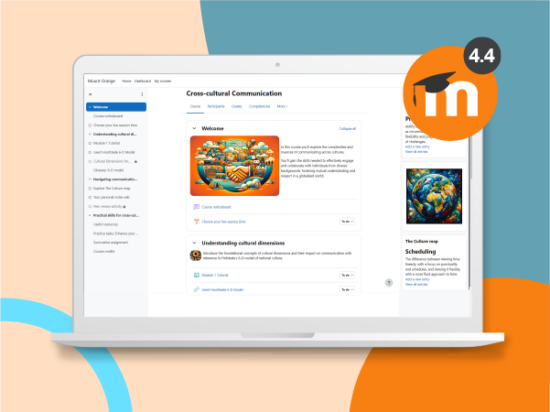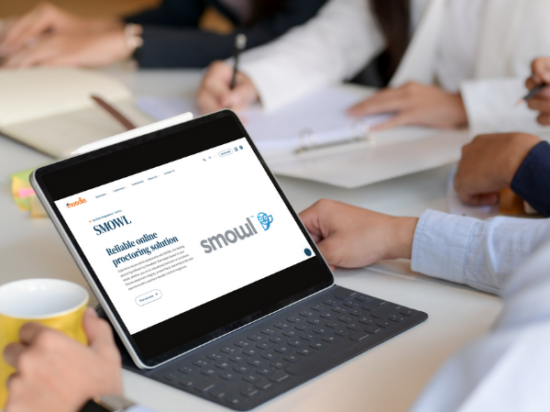Data complexity is increasing in education and workplace training, leading to a higher demand for seamless synchronisation between environments. Real-time updates for student records, curriculum materials, and assessments ensure streamlined learning in education. In workplace training, where interoperability is crucial, synchronised data facilitates the smooth flow of information across different teams, improving collaboration and operational efficiency.
This article discusses the significant importance of data synchronisation in education and workplace training. It addresses the challenges educators, institutions, and businesses face in this regard and explores the essential solutions required to maintain an up-to-date and cohesive learning environment.
What is data synchronisation?
Maintaining consistent and accurate data is essential for accessing the latest updates or historical records. Data synchronisation is the key to achieving this, as it ensures that user data, course content, access details, completion records, and achievements remain uniform, regardless of the platform or device used.
Regardless of where or how a learner completes a module or test, their performance data is always up-to-date and readily accessible for trainers, educators, or learners. Similarly, when administrators or trainers update course content, quizzes, or other materials, these changes are immediately reflected across all platforms and devices. This ongoing procedure involves harmonising data across different systems and applications, encompassing both current and historical information.
Why is data synchronisation important?
Data synchronisation plays a crucial role in ensuring the accuracy and currency of information, offering various benefits across reporting, decision-making, and enhancing learning experiences in both workplace training and educational settings. The advantages include:
- Current and reliable data: Maintaining consistently up-to-date and accessible information across platforms, devices, and locations. For educators and trainers, this translates to uniform course progress, grades, and learning materials.
- Efficient reporting and decision-making: Ensuring accurate and timely reporting, educators and trainers can make informed decisions based on synchronised data, identifying students needing support and aligning content with prevailing learning trends.
- Reduced error and duplication: Eliminating errors and repetitions inherent in manual data updates across multiple locations. With data synchronisation, changes on one platform instantaneously reflect across others, resulting in accurate records and simplified material updates.
- Compliance and accountability: Guaranteeing consistent, tamper-proof records that aid educators and administrators in effortless compliance tracking, be it for attendance or training certifications.
What data can be synced with Moodle LMS?
In the field of education, data synchronisation is crucial for operational efficiency and streamlined administrative processes. As institutions handle growing volumes of data, accuracy and consistency are essential. Educators rely on real-time, accurate information to tailor teaching strategies and provide timely feedback. Administrators manage enrollment processes, ensuring access to courses aligns with student registration. Data synchronisation creates a reliable environment for informed decision-making, personalised learning experiences, and regulatory compliance.
Moodle LMS provides seamless synchronisation of essential data and applications, which is highly beneficial for educational institutions:
- Course content: Moodle excels in the synchronisation of course materials, assignments, and resources. This empowers educators with the ability to effortlessly manage and update content, guaranteeing that learning materials are consistently accessible and relevant.
- User accounts, enrolment data and grades: A hallmark feature of Moodle is its synchronisation expertise in managing student and faculty profiles, enrolment data, grades, and assessments. This ensures accurate records and simplified administrative processes related to course access and enrolment management.
- Calendar events and discussion forums: Moodle’s synchronisation extends to calendar events, facilitating the efficient coordination of class schedules, assignments, and important dates. Simultaneously, the synchronisation of discussion forums promotes interactive online communication, fostering collaborative learning environments.
What data can be synced with Moodle Workplace?
Data synchronisation in the workplace helps bring all the training information together in one place, making it easier to manage employee records, certifications, and learning materials. This process keeps certification records consistent and lets teams easily share training materials. It monitors everyone’s progress in real-time, so administrators can quickly respond to any needs. Syncing data automates tasks, saving time and enhancing operation efficiency.
With Moodle Workplace, it’s easy to connect and integrate training programs with various data sources, including eCommerce, HRIS, CRM, and ERP systems. This allows for training to be quickly adapted to any changes in the organisation, ensuring that employees have the necessary skills to excel in their roles.
eCommerce data
When you connect eCommerce data with Moodle, trainers can sync details like product training sign-ups, user profiles, and search queries. With a certified integration like Myddleware, when new users buy a course, it automatically creates login details in Moodle. This means they can get instant access to the online courses they just purchased.
Human Resources Information Systems (HRIS) data
Syncing data from HRIS with Moodle automates the creation of user accounts based on HRIS entries, enrolling employees in the training courses that suit them. This ensures a single, consistent set of data across both systems, making it easier to manage and reducing the chance of discrepancies.
Customer Relationship Management (CRM) data
Integrating CRM data with Moodle can lead to targeted and effective training programs. This helps ensure that employees have the skills they need to excel in their roles. By aligning training with customer needs, organisations can adapt more quickly to changing demands. This approach also ensures that employees are equipped with the skills required to meet dynamic challenges.
Enterprise Resource Management (ERP) system data
Combining ERP data with Moodle enhances training outcomes by facilitating role-based course enrollment, streamlining onboarding processes, and delivering real-time training updates. It also reduces administrative burdens while offering a comprehensive view of training effectiveness and its correlation with employee performance.
Synchronising data with Moodle
Synchronising data on Moodle allows you to keep all data up-to-date and consistent across all devices and platforms. Moodle Certified Integrations like Myddleware enable seamless data transfer between Moodle and external systems such as e-commerce and CRM, boosting overall productivity and efficiency. Its user-friendly interface empowers educators, trainers, administrators, and managers to handle Moodle data alongside other applications effortlessly.
Similarly, Moodle plugins like NexSIS provide specialised solutions for connecting external systems like Student Information Systems (SIS) to Moodle sites, ensuring that student, course, and enrollment data stays consistently up-to-date. This automated process boosts efficiency for educators, administrators, and managers by ensuring that student, course, and enrollment data remains current and easily manageable through CSV files. Moodle also provides the NexSIS API version, enabling real-time integration between Moodle and external solutions. The NexSIS API supports both individual and bulk operations, utilising unique identifiers from the external system for seamless coordination.
Whether through open-source integrations or plugins, the process of syncing data on Moodle is designed to enhance efficiency and streamline the educational experience for all parties involved in the learning, teaching, and training processes.



